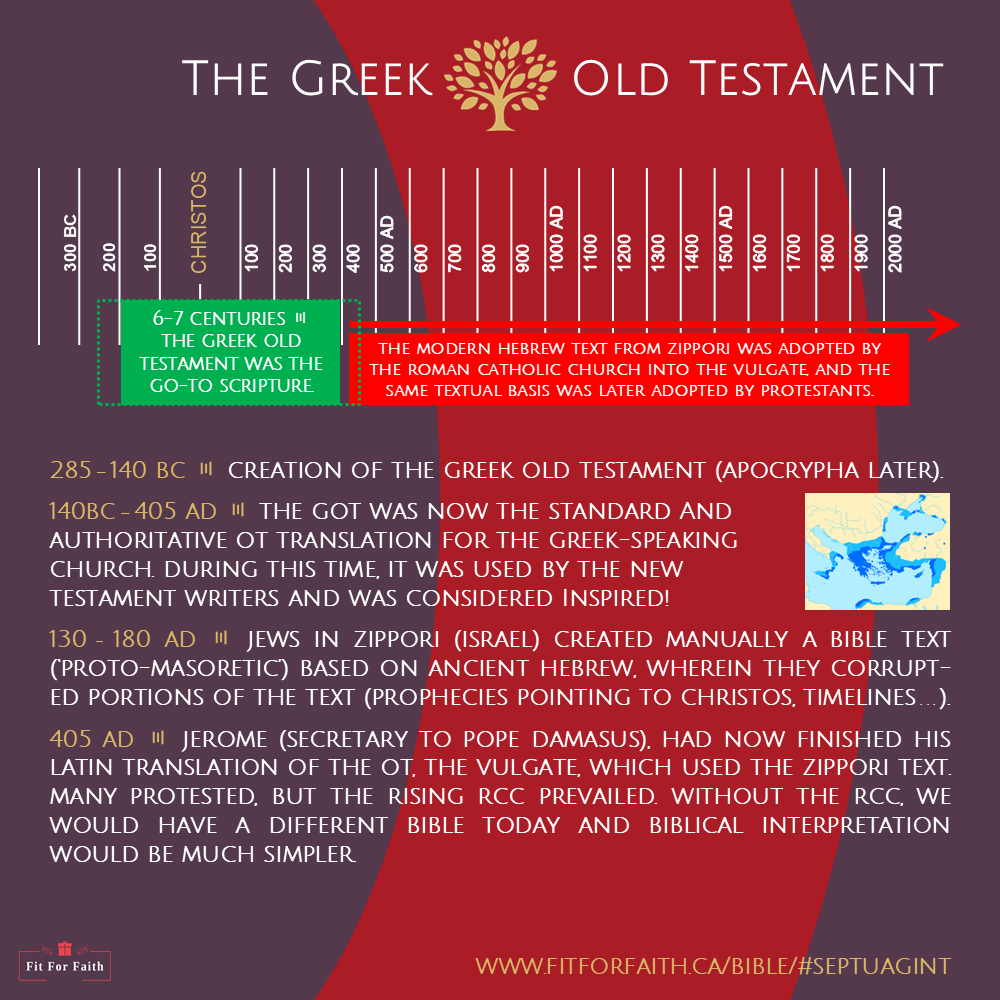The Bible
.
Bible Presentation
The basics. Learn in this comprehensive Bible presentation more about the origin, structure and overall message of the Bible. What are recommended Bible reading techniques and what are some key teachings? Which Bible translations should I rather not choose?
T he Greek Old Testament
Rediscover the Bible IESOUS read and quoted from. Our Hebrew Old Testament (Masoretic) texts are 99% identical with the Greek Old Testament (5 books of the Septuagint + 17 Other OT Books) texts, but suffered some retroactive, punctual and decisive manipulations - e.g. the watering down of prophecies about IESOUS CHRISTOS being the MESSIAH, and the falsification of 64% of the begetting ages in the genealogies that form the sole basis for the date of creation.
I compared the Koine Greek texts (without the non-canonical Apocrypha that were added later; see below) with the Modern Hebrew texts of our common Bibles, and am able to clearly prove the general superiority of the Greek Old Testament. Are we able to go back to 100% truth?
Related studies: Flood Chronology, Genealogies and Timeline - all with corrected dates!
Greek Old & New Testament Quotations
The world's first list of all Old Testament quotations with the following features:
Greek UNCIALS typeset; Word-for-word matching while comparing 'apples with apples' and not translations of 2 different languages with each other; Correction of the quotation found in Romans 11:35 which originates in Isaiah 40:14; Differentiation between quotations, allusions and retelling, and between long, short and segmented quotations of the same verse; Organized by original books and divisions.
Biblical Canon
The word of THEOS is inspired, but is the canon of 49 books (modern count of 66 books) also inspired? Find out what historians and scholars such as Athanasius, Eusebius, Hilary, Josephus or Melito stated about the precise canon of the Bible and learn why non-canonical books had been rightfully rejected.
Ecclesiastical Books (Apocrypha)
Find here an unbiased timeline that reveals the unbalanced 'truths' taught in different denominations. The Roman Catholic Church, its third doctor and patriarch of Calvinism (Augustine), and the final editors of the great codices were responsible for its inclusion (+7 books) in the 4th c. AD, while the late reformers included for the first time the full Apocrypha (+14 books) into our Bibles, having clouded this evil by creating a separate section for those books and giving them essentially the same weight as the 4 books excluded by Luther (Hebrews, James, Jude and Revelation). THEOS will judge all those who diluted His Word with other texts. May we never go back to include those works of human inspiration in between THEOS' 'two book covers' of His Word.
The timeline also clearly reveals that the original Septuagint, which is often used as 'scape goat' for the inclusion of the Apocrypha, did not include for at least 400 years the 'Septuaginta Plus', until many churches used-, and the great codices later added those 'Ecclesiastical' books.
Further Non-Canonical Writings
THEOS' Word is holy. It is therefore important to be equipped against the propagation of 'secret knowledge' humans are traditionally keen on. This study will touch the basics on non-canonical (-uninspired-) writings, such as the first century letters of the Apostolic ~Fathers~ (see Mat 23:9; with strong precaution, some good but many heretical writings), the popular Dead Sea Scrolls (with strong precaution - biblical texts mixed with sectarian and heretical texts), the Ecclesiastical Books / Apocrypha (with strong precaution, some are good to read as ordinary books) and Pseudepigrapha (strictly heretical teachings).
The books of Enoch and Jubilees - legit as some Christians claim? Clearly not - as I can prove through the unfulfilled Prophecy Of The 10 weeks (Enoch) and the corrupted timeline (Jubilees). Even Jews reject those books and consider them as Apocrypha.

